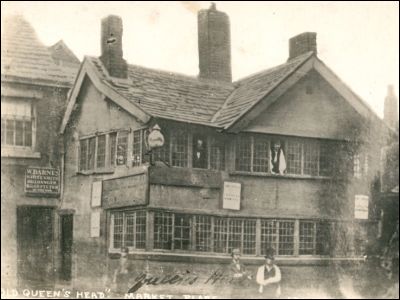|
 

WE illustrate above one of the old inns of Wigan, "The Queen's Head," which stood in the Market Place. It is one of the 68 Inns listed in "Whitehouse's History of Wigan, 1829," and although perhaps not so famous as the old "Dog" Inn (where Lord Derby slept the night after the Battle of Wigan Lane, 25th August, 1651), it is a typical example of the Inns of the period. These Inns were famous for their hospitality as witness the following account of a "Visit of three Gentlemen of Norwich." in 1634, which is quoted from "Travellers' Tales of Wigan," by Rev. T. C. Porteus. "VISIT OF THREE GENTLEMEN OF NORWICH.""A JOURNEY into the North of England was undertaken by three gentlemen belonging to Norwich, in the year 1634. They were officers of the Military Company in Norwich, and although their journey has a pretentious title beginning 'A Short Survey of 26 Counties,' it is evident that they were sightseers out for a good time, rather than scholars concerned in collecting careful information. Still the informal and lively account of their adventures is welcome and useful. Near to Wigan they were benighted and lost their way in a place where there were many coal pits (probably Standish or Shevington). Of the presence of the pits they were warned by the snuffing of their horses. Whichever way they looked they were led to those Tartarean cells. At last the melodious sound of a sweet cornet arrested their ears, and they were guided through the woods from this darksome haunted place by the sound thereof, to a stately fair house (probably Standish Hall) belonging to a gentleman who was High Sheriff of that good rich shire this year, into whose custody the three travellers would have committed themselves, but they understood that this house was, that night full of strangers." "SO they went to Wigan. They got a guide to direct them over a small river into the town, where they arrived late and weary and rested that night. They had fair headquarters afforded them by a fat, honest host, as alderman and jovial blade. His own castle, so the travellers wittily described it, was full. We are not told whether it was a hostelry or a private house, but he billeted the travellers at his neighbour's over the way, in two sumptuous chambers, where they slept soundly after that day's 'enchantment'." "NEXT morning they went to the Church to hear Morning Prayer and the musical instrument described as their 'fair organs,' after which they hastened home to their host, 'our jovial alderman.' But he intercepted them in the fair Market Place, accompanied by four representatives of the Church and Borough who kindly invited the travellers to join them in their morning drink. The Scribe made the comment that 'better ale and better company no travellers could desire'." |
|